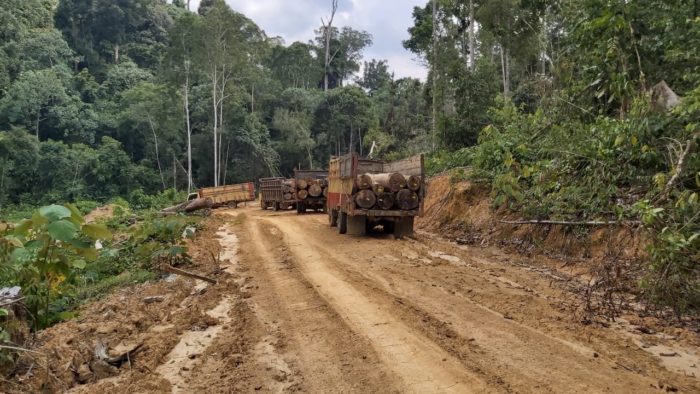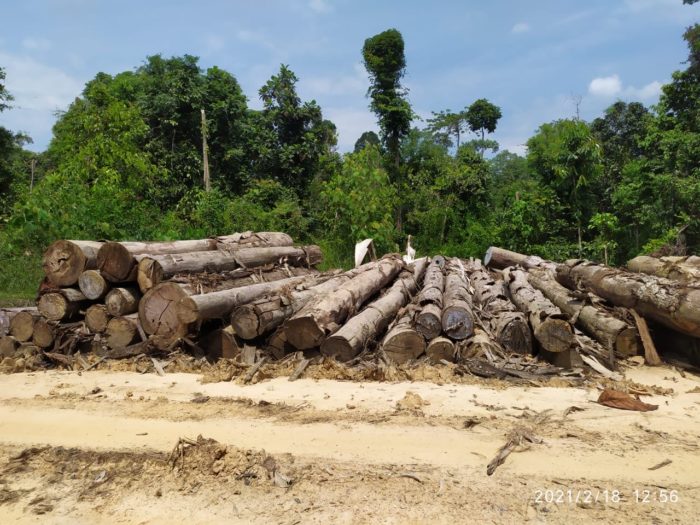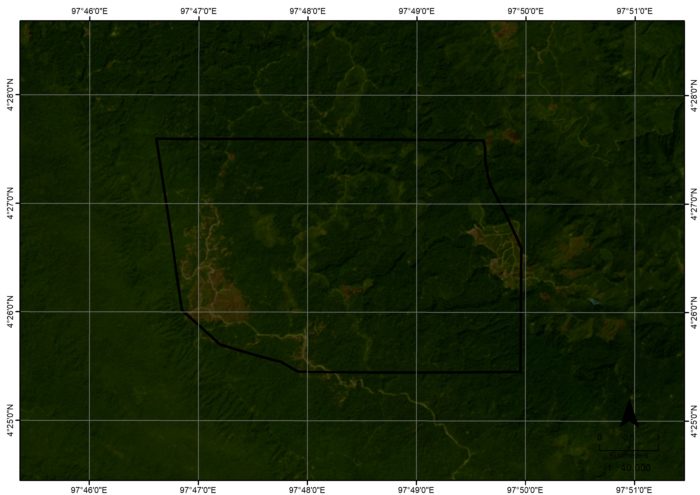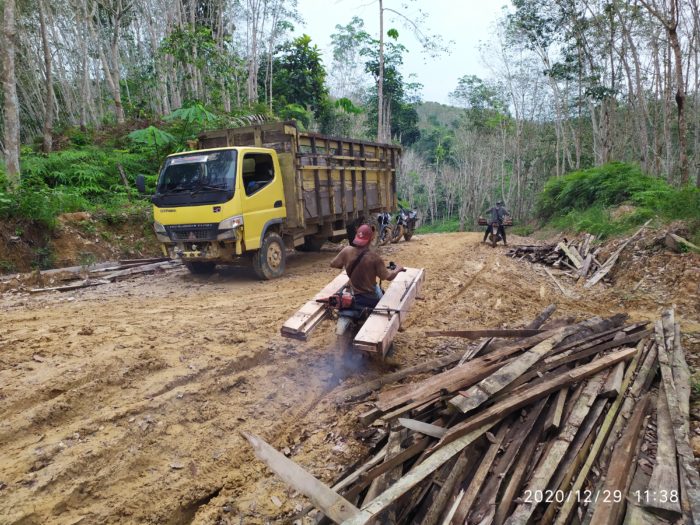Palm oil producer PT. Nia Yulided caught logging and road building in Aceh Timur
GPS Co ordinates N 4°25 ’31” E 97°48’00
A new investigation by Rainforest Action Network (RAN) has revealed that critical areas of Indonesia’s lowland rainforest continue to be destroyed, despite declarations by the national and Aceh provincial governments of a moratorium on clearing forests for palm oil in the Leuser Ecosystem.
The story of oil palm plantation company PT. Nia Yulided Bersaudara (PT NYB), found once again by RAN’s field investigators to be destroying forests and building new roads inside its palm oil concession as recently as January 2021, illustrates the failure of the government policy to keep these irreplaceable ancient forests from falling. RAN has documented that PT NYB has reduced the forest cover inside its concession area by at least 595 hectares since April 2016, when the moratorium on forest clearance took effect.

Log trucks transport harvested timber from the lowland rainforests of the Leuser Ecosystem inside PT Nia Yulided Bersaudara concession, January 2021 GPS Coordinates N 4°25’22” E 97°48’23
In December 2020 and again in January 2021, RAN’s field investigators documented contracted loggers felling rainforests within PT NYB’s concession.

Piles of timber documented inside PT Nia Yulided Bersaudara concession, January 2021
GPS Coordinates N 4°25 ’31” E 97°48’00
Using satellite monitoring, undercover investigations, and desk research, RAN has concluded that there are strong grounds to revoke the permit allocated by the provincial government of Aceh to PT. NYB to establish a palm oil plantation. The company’s persistent violation of the President of Indonesia’s moratorium on forest clearing for palm oil is by itself reason enough to suspend the rogue suppliers operations. But RAN has also uncovered potential collusion between PT NYB’s representative and Tarmizi Abdul Karim, the former acting governor of Aceh who issued the initial permit.

Satellite imagery from January 2021 shows that logging and roading persists inside PT Nia Yulided’s concession.
Company registration documents name Dedy Sartika, a son in law of the former acting governor of Aceh, Tarmizi Abdul Karim, as the President Director of PT. NYB. In 2012, when Tarmizi was appointed as the acting Aceh governor, PT. NYB sent a letter of application for a plantation business license to BPKEL (Leuser Ecosystem Management Body), but BPKEL refused to grant the permit because the plantation was located inside the Leuser Ecosystem.
The BPKEL was later dissolved by the Aceh Government in October 2012, allowing the permits to be granted, first by Tarmizi Abdul Karim, then by the following governor of Aceh Zaini Abdullah. The approval of the controversial, previously denied permit by the acting governor for the benefit of a member of his family creates a strong appearance of conflict of interest that merits further investigation.
The acting governor approved PT NYB’s permit despite earlier refusals from BPKEL – the former forest management body responsible for implementing national laws that afford protection to the forests of the Leuser Ecosystem – to grant the same permit due to the impact palm oil expansion would have on the forests within the proposed development area. The PT NYB case shows that nearly 5 years after the declaration of the palm oil moratorium in Aceh by the national and provincial governments, more progress is needed to fully implement the moratorium inside existing palm oil concessions in the Leuser Ecosystem and to revoke concessions of companies that have persisted in clearing lowland rainforests since its declaration.

Contracted logging crews continue to destroy the forests within PT Nia Yulided’s concession despite the government moratorium. December, 2021.
NYB may be a further example of a controversial palm oil plantation company that is prone to corruption. A study released by the Corruption Eradication Commission (KPK) has stated that corruption in the oil palm plantation licensing process often involves regional heads. Furthermore, Indonesia Corruption Watch (ICW) estimated the potential state financial loss as a result of the conversion of forest functions to oil palm plantations in Provinces of South Sumatra and Aceh can cost 177 billion Indonesian Rupiah.
There remains a strong case for the PT. NYB permit to be reviewed and revoked. Doing so will not only stop further destruction of the Leuser Ecosystem but will shine a light on the need for increased transparency and accountability in palm oil permitting processes in Aceh and beyond. This could be a turning point for the palm oil sector where it avoids corruption and conflicts of interests that enables benefits for certain groups, at the expense of the wellbeing for the wider community that continues to experience the impacts caused by rogue palm oil companies engaging in deforestation.
In order to demonstrate the effectiveness of the moratorium, intervention is needed by the Indonesian and Aceh provincial and district governments to halt logging, new roading and the clearance of lowland rainforests within all existing concessions in the Leuser Ecosystem, starting with revoking the permit of PT. NYB. Logging and land clearing persists in Indonesia due to the market demand for palm oil and pulp and paper products by major brands such as Ferrero, Mondelēz & Mars. As a matter of urgency, these brands must investigate and disclose their forest footprint and strategies to address the negative impact that their supply chains have on forests, peatlands, and the rights of Indigenous People and local communities in the Leuser Ecosystem and across Indonesia. Join us as we demand action.